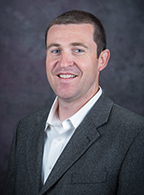University engineering team to design, analyze and test against high-level radiological materials threat
Wednesday, Jan. 17, 2018
MANHATTAN — From military groups to local first responders, newly funded radiation detection research at Kansas State University is expected to have far-reaching benefits.
The U.S. Department of Defense Space and Naval Warfare Systems Command has executed $100,000 for year one of "Radiological Systems Research for Detection, Localization and Isotope Identification," as part of a five-year initial award contract valued at $2.2 million.
The funds will support research and development of mobile radiation detection systems and their components used to find, localize and identify threatening radiological materials. Tasks undertaken will involve design, analysis and testing of state-of-the-art sensing technologies and their supporting systems.
Walter McNeil, assistant professor of mechanical and nuclear engineering, is the lead investigator, and providing project support will be Don Gruenbacher, associate professor and department head, and Bala Natarajan, professor, both electrical and computer engineering; and Amir Bahadori, assistant professor of mechanical and nuclear engineering.
"This is a multidisciplinary approach that will leverage the experience of K-State engineering faculty in radiation-sensing materials, sensor read-out, signal-processing and advanced data analysis, all of which are embedded within mobile instrumentation," McNeil said.
Testing will include assessment of radiological dispersal devices or "dirty-bombs" at national laboratory test sites such as Idaho National Laboratory, and will also collaborate with local military platoons at Fort Riley, such as the nuclear biological chemical reconnaissance vehicle platoon of the 48th Chemical Brigade.
"The mobile detection systems and methods explored in this work will benefit small military groups tasked with facing radiological threats in combat scenarios," McNeil said. "Domestically, these technologies are utilized by first responders and other emergency response personnel."
Resulting equipment investigated may ultimately be deployed on a variety of platforms, including light-armored military vehicles, unmanned systems and personnel.

